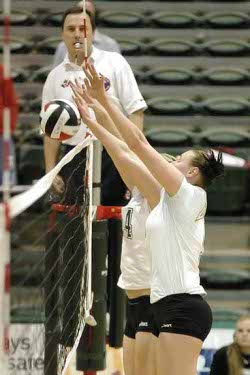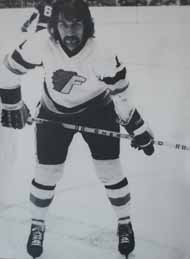Canadian Mennonite
Volume 12, No. 3
February 4, 2008
Sports and Religion
Sainthood & sports: Mutually beneficial or at odds?
In the face of increasing pressure from year-round organized sportsóthat now often play their games and schedule their tournaments on Sunday morningóchurches today are facing an uphill battle as they strive to get their young members into spiritual shape.
 |
The youth Sunday school teacher glances around the room. Four of 10 students are absent, one snores gently on the couch, and another looks like she is about to join the sleeper at any moment. A basketball tourney, early ice times and the pressure to catch up on homework have taken their toll.
Contemporary society, with its multitude of opportunities, exerts tremendous pressure as people struggle to set priorities. As more people are able to participate in sports, conflicts with church schedules have become common.
“Our church has all too much experience with Sunday sports and worship. . . . The concept you can’t miss worship for anything but sports . . . is troubling,” says Lorin Bergen, pastor at Living Hope Christian Fellowship in Surrey, B.C.
Youth leaders struggle to schedule weekday events around practices and weekend competitions. Church often takes a backseat to these demands.
Steve Wiebe, a Calgary high school basketball coach and member of Foothills Mennonite, understands the difficulty athletes face. “You get kicked off a team if you miss practices,” he says. “You don’t get kicked out of the church for not coming.”
While the conflict between sports and church schedules is nothing new, pastors are noticing an increase in sports events planned for Sundays.
‘You get kicked off a team if you miss practices. You don’t get kicked out of the church for not coming.’
“Over time you can see a shift that is taking place when it comes to when events are being planned,” says Jarrod Chamberlin, pastor of Elim Mennonite Church in Grunthal, Man. “Some time ago, you wouldn’t have games or tournaments being planned on Sundays out of respect for the importance of worshipping together. That, over time, has changed. Priorities . . . have shifted.”
Although sports can draw people away from church activities, they often provide important opportunities for personal growth.
Wiebe says he could talk for hours about the benefits, citing “discipline, commitment, teamwork and persevering through trials” as examples. “[Young athletes] also find a great place to belong, and for some kids that is exactly what is needed during the often-tumultuous teenage years,” he says.
Laura Duncan, a former University of Regina volleyball player (pictured in action on page 4), is clear about what she gained through sport: “Keeping in shape, learning teamwork, meeting new people, travel, learning to manage time, and learning coping skills under stressful situations.” Duncan is candid about how high-level competition—combined with science studies—affected her church life. “To be honest, I didn’t go to church all last year because of travelling on Sundays or playing on Sundays,” she says. “Then when we played at home usually I just didn’t put the effort in going to church, rather than catching up on sleep or homework.”
Finding a balance between the benefits of sports and participating meaningfully in a congregation is a constant struggle.
“Because of the major time commitment involved, it is hard to strike a balance between work, sport, family and faith,” Wiebe says. “I’m still searching for the answer to how to keep balance and perspective in my life!”
Parental role models play a crucial part in keeping children connected to their faith community.
“You are the parents, you set the priorities for the home,” Chamberlin stresses. “At times in life those priorities will be challenged, but it really comes down to you. . . . Sports will come and go, but the gift from Jesus Christ lasts forever.”
Wiebe suggests that parents put priority on worship time. “Most sports schedules cannot be changed, so if a family ensures that another time is set aside for meaningful devotions, worship and prayer, the importance of honouring and connecting with God is emphasized with your family.”
Growing pressure from sports means that churches—as well as families—need to employ new strategies to relate to young athletes, emphasizing personal connections and creative scheduling.
“Having the opportunity to be able to contact someone and feel safe about it really helps,” Duncan says, adding, “[B]eing able to e-mail can help people stay connected, . . . typing a quick question, talking with someone, spilling out emotions, or asking for a prayer, has helped me personally.”
Churches might also consider scheduling alternate worship times or Bible studies on a weekday evening, to enable those with Sunday morning conflicts to attend. There are many possibilities for churches, families and athletes to team up. Where they manage it, all parties stand to gain in physical, spiritual and community fitness.
Not a brawler
Former NHL draft pick speaks out about decision to stop fighting and leave hockey
 |
Willie Friesen’s “Damascus Road” experience came after a fight during the 1974-75 hockey season. A sixth-round draft pick of the Philadelphia Flyers, he was playing left wing for their farm team, the Philadelphia Firebirds of the North American Hockey League, when, during a game in Syracuse, N.Y., he dropped his gloves and fought a player on the other team. The crowd loved it, cheering on the combatants.
But later in the penalty box, Friesen had second thoughts. “I knew that guy. I played against him when we were both in Saskatchewan,” he told a rapt audience of over 300 youths and young adults at last year’s Peace-It-Together conference at Canadian Mennonite University (CMU) in Winnipeg. “And yet here I was fighting him far from home, cheered on by 10,000 people. It was like I was like a gladiator, entertaining the crowd.”
From then on, he said, “it was harder and harder to fight.” But getting to that point was a hard journey for Friesen, who was brought up in a Mennonite family in Saskatchewan. “I really liked to win,” he said of his younger years in sports. He also liked to play tough, and got into a lot of fights during games—something that deeply worried his father, a committed pacifist. “If one day you have to go before a judge to say you don’t want to go to war, how will you ever be able to say you are a conscientious objector with all your fights?” he said his father asked him.
But fighting was what his coaches wanted him to do. In junior hockey, he played on a line with future NHL Hall of Famer Bryan Trottier in Swift Current, Sask., scoring 25 goals in his last season with the Broncos. But that’s not what his coaches wanted. They wanted him to play tough and protect stars like Trottier—not put the puck in the net himself.
Once he was drafted by the Flyers in 1974 and sent down to their farm team, he did well, scoring 25 goals and being named runner-up for rookie of the year. “I had a good rookie year, but the Flyers weren’t satisfied; they wanted more toughness,” he said. “It was always the same speech.”
But after that night in Syracuse, Friesen didn’t want to fight anymore. The things his father had said about peace and living like Christ kept coming back. The following season, during training camp, he concentrated on playing, not fighting, and in one memorable NHL exhibition game scored two goals in a Flyers’ win.
After the game, though, he was called in to meet the coach. He thought it might be to tell him how great he had played and what a great addition he was to the team. But it was the opposite. “I was told that the Flyers hadn’t drafted me to score goals, but to play tough,” he said. “That’s when I knew I couldn’t do it anymore.”
He quit. At the age of 21, his pro hockey career was over “before it had ever really started,” he said. But, he added, “hockey was not where my gift was meant to be.”
After leaving hockey, Friesen joined the Calgary (Alta.) Fire Department, rising to the rank of lieutenant. “God has a plan for each of us,” he told the conference. “Hockey was not where my gifts were meant to be used.”
As for sports, Friesen, a member of Calgary’s Trinity Mennonite Church, said that Christian athletes need to know “the difference between winning and winning at all costs.” They also need to make sure that the drive to win doesn’t turn into “something that hurts other people.”
Nine men in: Modelling church on a ball team
Will Loewen wrote this article when he was still youth pastor at Tavistock (Ont.) Mennonite Church. He batted ninth and played right field for the Tavistock Twins. He is now serving with Mennonite Church Canada Christian Witness in South Korea.
 |
As I approached the age of 14, I dreamed of achieving a certain level of acceptance within my church. Sure, the beginning of high school meant that I could start attending youth group activities, and it meant that I could now join the cool Sunday school class that always got to do the fun Christmas skits, but, more importantly, 14 was the minimum age required to play on the church slo-pitch team.
I did have the occasional athletic flash of brilliance and the cute girls in the bleachers would sometimes even cheer for me by name. However, no matter how rare those personal successes were, I was part of the team. And when we won the championship, I got a medal just like everyone else.
When I was called to my present church to serve as the youth pastor, I was thrilled to be invited to play on the church ball team as well. This time, however, a few things were different. The bats, balls and gloves were all the same size, but the pitches were whipped in windmill style rather than lobbed in slo-pitch style. Another key difference was that the connection between this team and the church was quite loose, with only a few players actually attending on a regular basis. The first church league I played in outlawed any kind of alcohol use in uniform, while these guys gathered for beers after every game.
Would I be able to adjust to the skill level? Would I be accepted in this new social group?
I was determined to persevere at least one season. I liked how baseball could connect me as a pastor with other aspects of the community, and what other kind of activity did I have to keep me fit during hockey’s off-season?
I wasn’t sure what to expect after the first few months. I was the only person who wasn’t already close friends with at least one other player, I almost never knew who they were talking about in their post-game storytelling and reminiscing, and my weak play definitely hindered the team. Still, I was accepted around that beer cooler just like everyone else.
Would they feel as welcome at my church as I felt around their beer cooler?
Sometimes people at church would approach me and mention the baseball team. They would either regale me with stories of their own athletic conquests on that team before age or injury cut their career short, or they would commend me for playing with “those guys,” as though my presence on the team was an act of grace. However, I could only think that I was receiving grace much more than I was giving it. I started to wonder, would they feel as welcome at my church as I felt around their beer cooler?
Recognizing the grace I had received, I once thanked them for being so welcoming. They laughed it off, saying how cool it was that I even wanted to hang out with them. They knew I was a pastor, I didn’t drink, swear or condone pre-marital sex, and they had never seen me lose my temper with an opponent or an umpire. Knowing that, they assumed that I wouldn’t want to associate with them. Their experience of church had taught them that this would probably be the case.
So if I could convince them that their impressions of church were wrong, maybe they would start attending, right? What if I took all the good of the way our team operated and used that as a model for how to do church? What would that look like?
Our team has room for aging veterans and green-horned rookies, star performers and athletic failures, and everyone shares playing time. The coaching responsibilities are shared, and we all respect the decisions made by our peers. Around the post-game cooler, the circle is expanded every time another person shows up. Since everyone contributes equally, there is always enough to share. Players’ contributions on the field don’t change their status off the field.
No wonder we all enjoy playing together. If this is what they get from their baseball team, shouldn’t they also get it from their church?
For discussion
1. Does the conflict between sports and church activities happen in your family or congregation? Has this conflict been growing over time? Which sports have the most conflict with church activities? Which age groups have the most conflict? How do the families and individuals you know respond to the conflict?
2. What are some of the benefits of playing team sports? Should the church encourage its people to get involved in sports? Do you agree that the church shouldn’t force people to choose between sports and church? Should churches provide a worship time other than Sunday morning to accommodate those with Sunday morning conflicts?
3. Jamie Ramer works as a chaplain for junior hockey players. Are there other ways that the church can try to bring faith to the playing field or arena? Do church leagues work at outreach?
4. Willie Friesen says Christian athletes need to know the difference between winning and winning at all costs. Do Christian athletes know where to draw the line? Do recreational sports avoid the temptation of driving to win without regard for others?